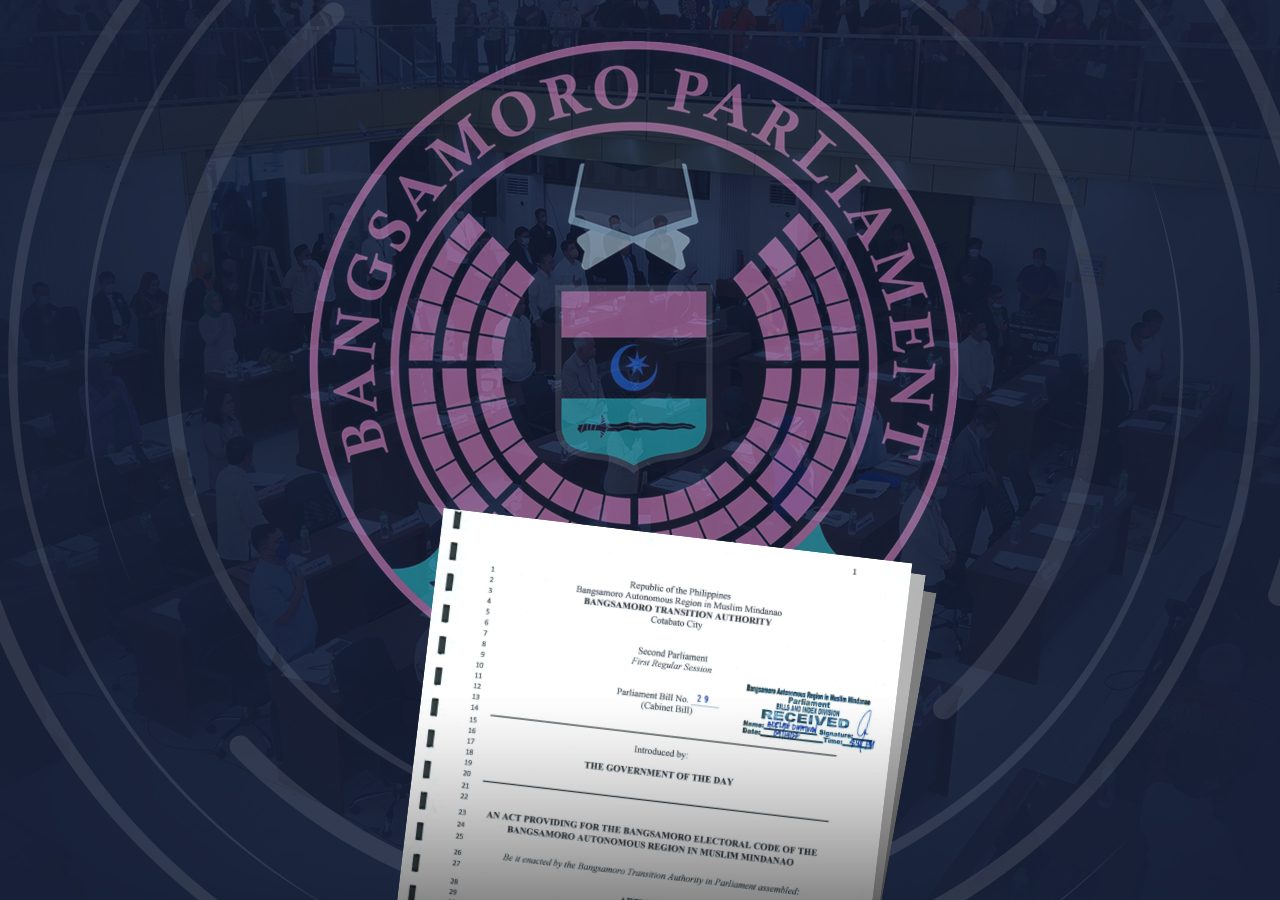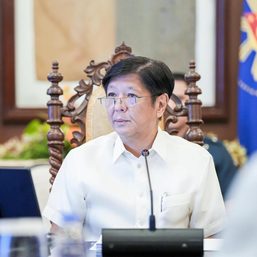SUMMARY
This is AI generated summarization, which may have errors. For context, always refer to the full article.

MANILA, Philippines – Bangsamoro Autonomous Region in Muslim Mindanao officials have come up with a draft of their electoral code, a crucial document needed for the 2025 BARMM polls to push through.
The Bangsamoro Transition Authority (BTA) already held a series of public consultations in Metro Manila on the 14-article code, presenting the draft to the Commission on Elections (Comelec), poll watchdogs, and civil society organizations among others.
But what are the key provisions, and what do advocates for clean elections think about it?
Context
In 2018, then-president Rodrigo Duterte signed the Bangsamoro Organic Law (BOL), which replaced the Autonomous Region in Muslim Mindanao with BARMM, whose regional government would have more autonomy and powers delineated from the national government. The law was ratified in a plebiscite in 2019.
The measure tasked the BTA – which is the interim government appointed by Duterte – to come up with the necessary legislations until the first elected Bangsamoro government assumes office in 2022. But that did not happen.
Pandemic-driven complications hampered, in particular, the crafting of the Bangsamoro electoral code (BEC), and lack of that document, and other deliverables by the BTA, made it virtually impossible for the Comelec in 2021 to determine the allocation of elective posts for the scheduled 2022 regional polls of the Bangsamoro parliament.
The House and the Senate approved the postponement of the regional elections from 2022 to 2025. Duterte green-lit the proposal, which in effect also extended the authority of the BTA, although new President Ferdinand Marcos Jr. had the authority to name new BTA members for the additional three years they will be in power.
What the parliament looks like
The Bangsamoro parliament, as provided by the law, will have 80 members, and the entity will have tremendous powers, such as enactment of laws, calling for referendum on issues, and conduct of inquiries, among others.
Half of the seats will be filled by representatives of political parties, not more than 40% will go to single members of parliamentary districts, while the rest will be reserved seats and those intended for sectoral representatives.

The draft code, in essence, “prescribes the structural, functional, and procedural principles in the election of officers within BARMM.”
For one, the proposed BEC empowers the Bangsamoro Electoral Office by creating bureaus under it that are in charge of overseeing political parties, ensuring parliament members’ compliance with the code, and investigating election complaints, among others.
Two seasoned election watchdogs – the National Citizens’ Movement for Free Elections (Namfrel) and the Legal Network for Truthful Elections (Lente) – have come up with position papers on how to improve the proposed document. The following are only some of their recommendations.
1. Creation of a vulnerable sectors’ bureau
Lente said the six proposed bureaus are not enough to address the concerns of vulnerable sectors such as persons with disability and senior citizens, and proposed the formation of a vulnerable sectors’ bureau.
“The creation of this bureau would ensure that vulnerable sectors are able to fully exercise their rights of suffrage through the formulation, implementation and assessment of policies that will increase the accessibility of the electoral processes such as but not limited to registration, campaigning, and voting,” Lente said in a press release.

2. Clarity on intent of some provisions
Based on the proposed code, registered political parties are tasked to submit to the BEO a list of nominees ranked from 1 to 40, which is the most number of seats allotted for political parties. When a party receives 4% of the total votes in the parliamentary election, it is guaranteed one seat.
“The parties that are entitled to guaranteed seats shall be ranked from highest to lowest according to the number of valid votes they obtained. Additional seats shall be allocated to the winning parties only, with each winning party entitled to such number of additional seats as are in proportion to its total number of votes,” the proposed BEC read.
Namfrel said it is interested to know why BTA officials set the minimum threshold at 4%, and asked what would happen if no party meets that requirement. Will seats be distributed to top parties that obtained the highest vote share? Will parties be allowed to form coalitions?
The watchdog also proposed clarity in the wording of the provisions, to:
- ensure that parties entitled to additional seats would not benefit twice from an already guaranteed seat
- avoid confusion on the issue of decimals
- make sure that no seats will be left unfilled (as Namfrel raised a scenario of that happening even after parties that met the 4% threshold are allocated seats)
3. Better mechanisms to ensure diversity
Based on the draft code, at least 10% of the 40 nominees that political parties will submit should be women.
Namfrel, however, pointed out that a party may place women at the bottom half of the list. That significantly reduces the chances of women parliamentarians, unless the party wins 100% of the vote.
The group suggested a “zipper list” in the first 10 nominees, where women nominees would alternate with non-women nominees.
As for sectoral representation, Namfrel suggested that the number of seats for non-Moro indigenous people be increased to five to offer at least one representation each for the Teduray, Lambangian, Dulangan Manobo, B’laan, and Higaonon.
The group also opposed the draft code provision saying that the parliament would be the one to nominate sectoral representatives from among members of sectoral organizations registered with the BEO and certified by the BARMM government ministries.
Namfrel expressed caution that such a provision would defy genuine representation, and would put at a disadvantage sectoral parties that are not cozy with the ruling political parties overseeing the ministries.
“Namfrel recommends that the sectoral representatives must be nominated by the sectoral organizations, who are elected by the members of the sectors involved,” it said. “In the petitions for accreditation before the BEO, the sectoral organizations must include a list of nominees in chronological order. The first nominee of the winning organization per sector becomes the sectoral representative.”

4. Inclusion of provisions vs political dynasties, turncoats
Lente also asked the BTA to consider inserting anti-political dynasty provisions, and requiring political parties to have a “membership book” to prevent the proliferation of turncoats.
Currently, the proposed code only requires that parliament members be Filipino citizens at least 25 years old, able to read and write, and registered to vote in the BARMM.
Namfrel called on the BTA to include in the provision the line “must not be related within the second civil degree of consanguinity or affinity to any incumbent elected national official or to any incumbent elected regional, provincial, city, municipal, or barangay official, in the locality where the appointive or elective official seeks to be elected.”
Target passage
The full copy of the document can be accessed below:
Bangsamoro Parliament Floor Leader Sha Elijah Dumama-Alba has promised to expedite the passage of the electoral code, targeting an approval by the first quarter of 2023.
“While expediting the passage of the proposed measure, the parliament wants to ensure that the electoral code would be free of any constitutional flaws,” a press release by the legislative body read. – Rappler.com
Add a comment
How does this make you feel?




![[WATCH] #TheLeaderIWant: Filipino voters sound off on community issues a year before 2025 elections](https://www.rappler.com/tachyon/2024/05/filipino-voters-sound-off-on-community-issues-1.jpg?resize=257%2C257&crop=276px%2C0px%2C720px%2C720px)
There are no comments yet. Add your comment to start the conversation.